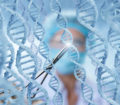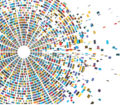Imagine a large family reunion where almost everyone likes each other. That should give you a sense of the annual Future of Genomic Medicine (FOGM) conference, which celebrated its tenth anniversary last week at the Scripps Seaside Forum.
Hosted by Eric Topol and the Scripps Translational Science Institute, FOGM takes a broad view of genomics: basic science, emerging technologies, patient care, public policy, the limitations of the genome and the seemingly endless promise.
Attendees love this conference for the epic surroundings (hard to beat Scripps Pier in March), all-star lineup and wide range of ideas. Presenters only get around 20 minutes to talk, which means there are lots of them, and they have to get to the point.
Not enough room to capture everything, but here’s a smattering. The new word everyone learned was “previvor,” which means someone who has a known mutation for a disease but does not yet have the condition. As sequencing becomes more prevalent, this term will come up a lot.
Like most biology conferences, gene editing (a technique called CRISPR) was front and center. Much CRISPR news revolves around the ethical dilemmas (designer babies, etc.) and intellectual property battles, but the technology has the potential to help treat many conditions, such as sickle cell disease, Duchenne’s muscular dystrophy and beta-thalassemia, a condition that deprives the body of oxygen.
Scientists are also using genomics to track pathogens, like Ebola and Zika. Sequencing can tell where a virus came from, whether it’s mutating and other useful data.

Ed Yong illustrates fecal transplants with emojis.
What about getting your own genome sequenced? New York Times and Stat journalist Carl Zimmer described his sequencing odyssey. Short answer: not difficult to get the sequence, but figuring out what it means, that’s a taller order.
Ed Yong, who writes for The Atlantic and is promoting his new book, I Contain Multitudes, gave a succinct primer on the microbiome, including a brief clip on fecal transplants told quite tastefully with emojis.
UC San Francisco’s Atul Butte pointed to the wealth of publicly available genomic information on the Internet. You could found a biotech in your garage by simply crunching the existing data.
Jeff Huber, who lost his wife to cancer a month before becoming CEO at Illumina spinoff GRAIL, described their efforts to create a blood test to detect early-stage cancers. The test would sequence cell-free DNA, but the technical challenges are huge: there may only be a handful of cancer markers in an entire tube of blood. Still, he believes liquid biopsies will become routine, like testing for cholesterol or blood glucose.
One of the many highlights was cardiologist, researcher and author Siddhartha Mukherjee, who won a Pulitzer for Cancer: The Emperor of All Maladies. His most recent work, The Gene: An Intimate History (which was partially inspired by this conference), is being made into a Ken Burns documentary. When asked how he balances patient care, research, writing and everything else, Mukherjee said he doesn’t, something always has to suffer. Points for honesty.
Mukherjee also revealed the topic for his next book, which will complete the trilogy started by Cancer and The Gene. He asked that no one tweet it out – though he probably knew the conference was trending on Twitter. Anyway, his next book will be about immunology. Shhhh, don’t tell anyone.
Tags: Biology, Blogs, Eric Topol, Genomics, Hatch Blog, Sequencing






























